More than 300 witnesses converged on the Office of the U.S. Trade Representative (USTR) for seven days last week to provide input on how tariffs of up to 25% on $300 billion in Chinese goods would affect their business or interests. Many of the witnesses were opposed to the proposed list four tariffs, while others appreciated the effort to make their products more competitive.
Before proposed tariffs go into effect, there is an opportunity for public comment. Business across a range of industries testified to have products removed from the fourth list of tariffs. Witnesses used numbers to show the massive scale of trade that would be impacted, and many used similar arguments to show how their companies would be impacted by the duties.
Throughout the seven days of hearings, four common arguments — for and against the tariffs — emerged.
1. Moving suppliers is tough, time-consuming or not an option
Though reinvigorated in recent months, the trade war is not new, and manufacturers have already been looking at alternative sourcing options. But multiple companies testified that finding new sourcing was either impossible or would take months to years to accomplish.
"The cost to move our remaining production operations out of China, purchase new machinery and train a new workforce is likely to cost us a minimum of $3 million, and would take at least one year to commercialize and start production," said Katie Tangman, director of global customs and trade at Columbia Sportswear.
Dennis Trice, executive advisor and former president and CEO of Mitsubishi Chemical America, expressed a similar sentiment. He said the materials his organization purchases from China are higher quality than those available elsewhere and feed manufacturing plants in the U.S. "They are absolutely critical to the success of our investment in Memphis and our ability to manufacture electrolytes for lithium-ion batteries in America," Trice testified.
In fact, Mark Corrado, the president of Leading Lady, said it's labor and not necessarily materials that his company has trouble finding in the U.S: "One of the reasons that we've been forced to move offshore is that people don't sew in the U.S. anymore. We had five domestic factories years ago, and most women in the rural areas grew up sewing, so we had no issue finding employees." That is no longer the case, said Corrado.
2. Tariffs add costs, chip away margins
"We operate on thin margins," said John Hayes, president and CEO Ball Corporation. "The effect of a 38 percent tariff on the price of our most important raw material threatens to stifle investment and job growth."
Several speakers put the cost of List 4 tariffs in the millions and Frank Bodin, vice president of finance and administration Nordic Group USA, explained the effect wouldn't be drawn out, but quick.
"Products from China represent 35 to 50 percent of the seafood we sell into the companies I represent. In a small margin business, any loss in volume will quickly turn a profitable business into an unprofitable business," said Bodin.
3. Some products are low tech or safe from theft
One of the Trump administration's arguments for imposing tariffs is China is stealing the intellectual property of American companies. Several speakers at the USTR hearings said in their cases, there is nothing to steal because their products are relatively low-tech, or they are comfortable with the protections they have in place — They argued the tariffs lead to lowered margins or added expense with no long-term benefit to be gained.
"Both container manufacturing process and containers themselves are decidedly low-tech, essentially steel boxes which have remained constant in design and construction for the last 60 years," said Steven Blust, the president of the Institute of International Container Lessors, representing the first camp.
Mustafa Ozgen, the senior vice president and general manager of account acquisition Roku, fell into the second camp, expressing no need for government protection of his company's intellectual property.
"We have agreements with our manufacturers that protect our intellectual property, and I can happily report that those business arrangements are working well," Ozgen said. "Also, our closed proprietary operating system doesn't allow just anyone to access our source code."
4. Tariffs help us remain competitive
Not all manufacturers fall into these camps, of course. Some speakers voiced support for tariffs after what they see as years of an unfair marketplace driven by cheap labor and Chinese government subsidies.
Hilary Moffett, senior director of government affairs at Occidental Petroleum Corporation, supports what list four tariffs could do for her industry.
"Imposition of a 25 percent tariff on Chinese dichlor and trichlor will greatly benefit U.S. manufacturers and the workers as we compete with imports from China," she said.
Occidental's products are not sold directly to consumers, and Moffett explained the impact will only work to rebalance the market. "Imposition of tariffs will not have a significant impact on the ultimate consumer of chlorinated isocyanurates. At the same time, placing tariffs on dichlor and trichlor will assist an industry that has suffered the effects of unfair trade for many years," she said.
Even the tariffs that could hit consumer products had supporters.
"We support tariffs on finished textiles and home furnishing end products, and we favor an exclusion process for imported manufacturing inputs," said Kathi Dutilh, the manager of government relations for Milliken & Company. Dutilh did, however, ask the committee to reconsider tariffs related to some of the raw materials the company sources from China.
What's next?
The USTR hearings ended on June 25, after which business and individuals have a seven-day period to file rebuttal comments. The earliest the tariffs could be imposed is July 2.
President Trump is meeting today and tomorrow with Chinese President Xi Jinping to discuss the ongoing trade war. "The 'best case' for this G-20 is a similar outcome to the last: new talks coupled with a decision to postpone the new tariff round," analysts at Cowen said, according to CNBC.
A spokesperson for the USTR told Supply Chain Dive the Section 301 Committee would "review the public comments and the testimony at the public hearing. Based on this review, the U.S. Trade Representative may determine revisions to the proposed list."





















